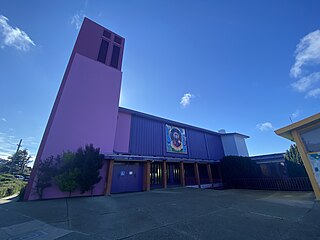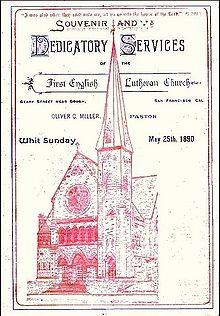The Evangelical Lutheran Church in America (ELCA) is a mainline Protestant Lutheran church headquartered in Chicago, Illinois. The ELCA was officially formed on January 1, 1988, by the merging of three Lutheran church bodies. As of 2022, it has approximately 2.9 million baptized members in 8,640 congregations.

The Wisconsin Evangelical Lutheran Synod (WELS), also referred to simply as the Wisconsin Synod, is an American Confessional Lutheran denomination of Christianity. Characterized as theologically conservative, it was founded in 1850 in Milwaukee, Wisconsin.

The Evangelical Lutheran Church in Canada is Canada's largest Lutheran denomination, with 95,000 baptized members in 519 congregations, with the second largest, the Lutheran Church–Canada, having 53,165 baptized members. Together with the LCC and the Canadian Association of Lutheran Congregations, it is one of only three all-Canadian Lutheran denominations. It is a member of the Lutheran World Federation, the Canadian Council of Churches, the World Council of Churches, and the Anglican-Lutheran North American grouping Churches Beyond Borders. According to the 2011 Canadian census, a larger number of 478,185 adherents identify as Lutheran.

The American Lutheran Church (ALC) was a Christian Protestant denomination in the United States and Canada that existed from 1960 to 1987. Its headquarters were in Minneapolis, Minnesota. Upon its formation in 1960, The ALC designated Augsburg Publishing House, also located in Minneapolis, as the church publisher. The Lutheran Standard was the official magazine of The ALC.
ReconcilingWorks, initially named Lutherans Concerned for Gay People and subsequently Lutherans Concerned/North America, is an organization of laypeople, pastors, and congregations primarily from the Evangelical Lutheran Church in America (ELCA) and the Evangelical Lutheran Church in Canada (ELCIC) working for the full acceptance and inclusion of people of all sexual orientations and gender identities and expressions in the life of the church. It is one of many LGBT-welcoming church movements to emerge in American Christianity in the late 20th century.

Lutheran Congregations in Mission for Christ (LCMC) is an association of Lutheran congregations located primarily in the United States. It describes itself as an affiliation of autonomous Lutheran churches and not a denomination. It began in 2001 in response to some liberal views of the Evangelical Lutheran Church in America (ELCA). LCMC is characterized by the stances it takes on Lutheran polity, biblical authority, and human sexuality. The group describes itself as "centrist" or "mainstream", noting that it stands between the more liberal ELCA and the more conservative Lutheran Church–Missouri Synod (LCMS) and other Lutheran church bodies in North America.

The Lutheran Book of Worship (LBW) is a worship book and hymnal published in 1978 and was authorized for use by several Lutheran denominations in North America, including predecessors of the Evangelical Lutheran Church in America and Evangelical Lutheran Church in Canada. The Lutheran Church—Missouri Synod was initially involved in the hymnal's development but officially withdrew.
The Divine Service is a title given to the Eucharistic liturgy as used in the various Lutheran churches. It has its roots in the Pre-Tridentine Mass as revised by Martin Luther in his Formula missae of 1523 and his Deutsche Messe of 1526. It was further developed through the Kirchenordnungen of the sixteenth and seventeenth centuries that followed in Luther's tradition.
Lutheran viewpoints concerning homosexuality are diverse because there is no one worldwide body which represents all Lutherans. The Lutheran World Federation, a worldwide 'communion of churches' and the largest global body of Lutherans, contains member churches on both sides of the issue. However, other Lutherans, including the Confessional Evangelical Lutheran Conference and International Lutheran Council, completely reject homosexuality.

herchurch is another name used for the Ebenezer Lutheran Church in San Francisco, a congregation within the Evangelical Lutheran Church in America (ELCA). The church is a member of the San Francisco Council of Lutheran Churches. The church was founded on August 10, 1882, by Augustana Lutheran minister Johannes Telleen, who served as its pastor until 1890. The construction of the first church building was completed in 1895. For many years, the church primarily served the Swedish population; the original church building was designed by Swedish American architect August Nordin.
Extraordinary Lutheran Ministries (ELM), founded on October 31, 2007, is an organization committed to the full participation of persons of all sexual orientations and gender identities in the life and ministry of the Lutheran church.
The ordination of lesbian, gay, bisexual and/or transgender (LGBT) clergy who are open about their sexuality or gender identity; are sexually active if lesbian, gay, or bisexual; or are in committed same-sex relationships is a debated practice within some contemporary Christian denominations.
The 2009 ELCA Churchwide Assembly was the eleventh biennial Churchwide Assembly of the Evangelical Lutheran Church in America. It convened in the city of Minneapolis, Minnesota, from August 17–23, 2009. The Churchwide Assembly is the 'highest legislative authority' of the ELCA.

Lutheran Worship (LW) is one of the official hymnals of The Lutheran Church–Missouri Synod (LCMS). Published in 1982 by Concordia Publishing House in St. Louis, Missouri, it is the denomination's third English-language hymnal and was intended to replace The Lutheran Hymnal (TLH). Additional hymns and service music are contained in the companion, Hymnal Supplement 98.

R. Guy Erwin (Osage) is an American Lutheran bishop. He was elected in 2013 to a six-year term as bishop of the Southwest California Synod of the Evangelical Lutheran Church in America (ELCA). Since August 2020, he has served as president of the United Lutheran Seminary in Philadelphia.

St. John's Lutheran Church is a member congregation of the American Association of Lutheran Churches (AALC) in Pocahontas, Missouri.

The Sierra Pacific Synod is one of the 65 synods of the Evangelical Lutheran Church in America (ELCA). It covers central and northern California and northern Nevada and supports ELCA congregations throughout that region. It was headed by bishop Megan Rohrer who resigned on June 6, 2022.

Megan Rohrer is an American activist for homeless and LGBTQ+ rights and former Lutheran bishop. Rohrer is the first openly transgender minister ordained in the Lutheran tradition.














